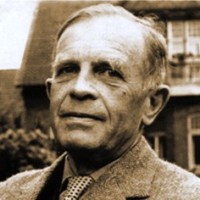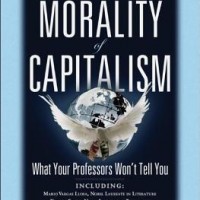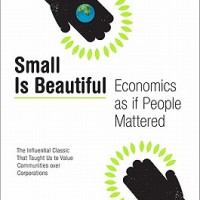Wilhelm Roepke: German Economist as Southern Neighbor, by Ralph E. Ancil
How can a German economist be called a Southerner? Obviously not geographically but in the important sense that Southern Agrarians came to understand, as a possession of the mind and spirit. That Wilhelm Roepke’s mind and spirit, embodying the best of the German tradition, share significantly in the essential features of the Southern heritage is not too surprising when it is recalled that Southern culture itself was essentially European.
In evidence of this there are some suggestive comparisons that can be made here. For example, Richard Weaver went home in spring to farm his ancestral fields with horse and plow and refused the use of airplanes, preferring trains for long distance travel. Similarly, Roepke promoted urban gardening for the health of city-dwellers and refused to use ski-lifts, preferring to ride up the mountain slopes on shank’s mare. Or one may refer to the Southern fondness for the books of Sir Walter Scott whose stories of Saxon yeomen fighting Norman invaders parallels those of William Tell fighting Austrian conquerors as eulogized in Schiller’s famous poem, admired by Roepke. Then one may conjecture about the influence of Germans and Lutherans on Southern life. Certainly, Luther himself was a social medievalist and agrarian and longed for the non-commercial life of an earlier time. To what extent this affected Southern life is arguable as is the effect of his Lutheran faith on Roepke’s outlook. But the parallels are thought-provoking.
Read the complete article in The Imaginative Conservative
Capitalism vs. the Free Market, by Ivan Pongracic.
Greedy bankers, overpaid executives, anaemic growth, the stubbornly high unemployment—these are just a few of the things that have lately driven protesters on to the streets and caused the wider public in the developed world to become disgruntled about capitalism. The system, in all its different varieties, is widely perceived to be failing to deliver.”
This is how, in January of 2012, the Financial Times started its series “Capitalism in Crisis” (italics are mine). Even worse, the introductory article then continued, the above mentioned villains simply bought the politicians and “bought themselves protection from proper societal accountability.” So for the next four weeks, economists, politicians, editorial writers, and just about anybody else, attacked or defended something called “capitalism,” trying to offer explanations for what we have experienced in the last several years.
Two books reviewed here are, in a way, the continuation of this same battle. The Morality of Capitalism: What Your Professors Won’t Tell You is a short book edited by Tom G. Palmer, of the Cato Institute but also of Atlas Network and Students for Liberty. It consists of his Introduction and fourteen essays by fourteen different writers, all of them categorically defending capitalism as the best and most moral system of all economic systems tried so far. The book, unapologetically, offers the reader the Truth: “Capitalism is a system of cultural, spiritual, and ethical values. . . . Indeed, capitalism rests on a rejection of the ethics of loot and grab . . . [It is in other economic systems where] predatory elites use [a] force to gain monopolies and to confiscate the produce of others through taxes.”
As a professor, I must admit, I have no problem with defending a system so defined, but the question I pose is, has capitalism really proved itself so pure in the real life? We’ll come back to this in a moment.
Defending the Free Market: The Moral Case for a Free Economy, by Father Robert Sirico, president of the Acton Institute, has the same goal but a different approach. Through a personal story, Father Sirico tells us how he came to discover the Truth—actually two truths: economic and spiritual. Realizing that our country has a huge problem, he warns that “when a people surrenders their [sic] freedom to government—the freedom to make moral, economic, religious, and social choices and then take personal responsibility for the consequences—virtue tends to waste away and faith itself grows cold.” Only responsible people can save America. “Philanthropy, charity, voluntarism, activism, and care for the family and the poor are all related to the same impulses that drive the market economy: the peaceful and free association of people in the service of others.” Again, no problem in defending such a system, but is such a system possible at all?
Let’s turn, first, to some definitions, as one must be careful in word choice when economic systems are discussed. Palmer does insist, as the title of the book implies, on using the word capitalism. In the section “The History of a Word,” he tells us that the word was not invented by Karl Marx, as usually believed; it was already used in the twelfth and thirteenth centuries. Only with the birth of socialism did the word become a term of abuse. Despite his explanation, I, myself, see no reason for insisting on the word. Even several of the contributors in his book use terms like “the free market” and “the market economy,” trying to avoid a word so ambiguous and by now so ill-reputed. The above quoted article from the Financial Times insists on many variants of capitalism. Father Sirico himself calls it “admittedly a narrow and problematic word.” Palmer simply decided to shrug off such linguistic pedantry.
Unfortunately for Palmer, the term “capitalism” must be heavily qualified to have any meaning. The word has become so horribly unclear that it may have about as many interpretations as interpreters. It may describe financial capitalism, where mathematical geniuses are allowed to turn almost any piece of paper into wealth by using esoteric equations and giving them fancy names, like “synthetic CDO squared” instruments; the word may describe state capitalism, as in fascism and National Socialism, where governments decide what, when, and how to produce the things they deem important; it may describe free-market or entrepreneurial capitalism, as those who like the word usually call it; it may describe cowboy capitalism, as those on the left prefer to call it; or, finally, the word may describe crony capitalism, as Palmer himself does a couple of pages later. (Sirico tries to escape the traps of crony capitalism by naming that concept as cronyism, but the main problem persists: would the real capitalism please stand up?)
The fact is, for those less informed than Palmer (including perhaps those professors from the subtitle?), it is too easy to put all capitalisms in the same category and conclude that capitalism tends to devolve into an immoral system. Even Palmer sets himself up when he discusses crony capitalism. First, he tells us how Marx himself praised capitalism for improving productivity, for creating “a world literature,” for overcoming the hatred of foreigners, among other advantages. But then he quotes Marx as saying that the whole system is based on public credit. It is the state that helps the capitalists become richer, that protects them, and “[a]ll political upheavals perfected this machine instead of smashing it. The parties that strove in turn for mastery regarded possession of this immense state edifice as the main booty for the victory.”
Two pages later, in a section titled “Free-Market Capitalism vs. Crony Capitalism,” Palmer complains that we should never confuse the two. Sadly, he says, “crony capitalism is the term that can with increasing accuracy be applied to the economy of the United States, a country in which failed firms are routinely ‘bailed out’ with money from taxpayers, in which the national capital is little more than a gigantic pulsating hive of ‘rent-seeking’ lobbyists, bureaucrats, politicians, consultants, and hacks, and in which appointed officials of the Treasury Department and the central bank [the Federal Reserve System] take it on themselves to reward some firms and harm others.”
Isn’t that exactly what Marx just said? Is Palmer proving Marx right? Does capitalism inevitably end up in crony capitalism? And if so, how can Palmer declare capitalism not only moral, but the most moral of all economic systems?
Read the complete article in The University Bookman
Small is Beautiful & Faithful: The Vision of E. F. Schumacher, by Joseph Pearce
A little over a century ago, on August 16, 1911, the great visionary economist E. F. Schumacher was born in the German city of Bonn. An icon of the early Green movement, few people seem to know that Schumacher’s vision was inspired by the great papal encyclicals of Leo XIII and Pius XI or that Schumacher himself was a convert to Catholicism.


